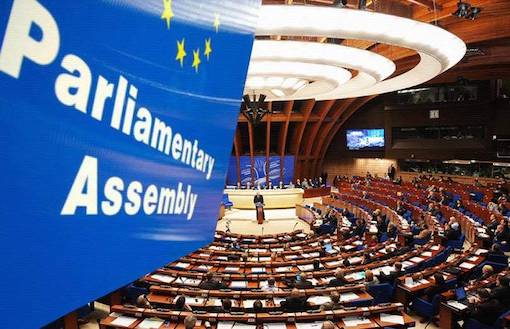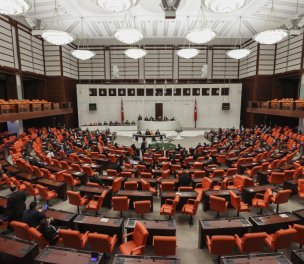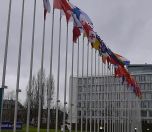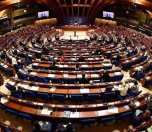Standing Committee of The Parliamentary Assembly of The Council of Europe (PACE) has on Friday during the last session of 2020 strongly condemned new crackdowns on political opposition and civil dissent in recent months in Turkey and urged the Turkish authorities to "take meaningful steps" to improve standards in the field of democracy, rule of law and human rights.
Approving a resolution based on a report by Thomas Hammarberg (Sweden, SOC) and John Howell (United Kingdom, EC/DA) following an urgent debate, the Standing Committee – acting in the name of the Assembly – said investigations and prosecutions targeted local politicians, members and former members of parliament, members of opposition political parties and lawyers. Continued undue pressure was also exerted on journalists, civil society activists and other groups, it added.
The resolution was voted for with an overwhelming majority, almost unanimously with the abstention of the Russian delegation and the Azebaijani delegation joining Turkey's ruling coalition deputies against. The ruling coalition's amendment proposals for omitting almost all articles of the draft critical of the ongoing situation in Turkey, including mentions by a CPT report on the situation of Mr. Öcalan and other prisoners in the Imrali Island Prison were also rejected with an overwhelming majority.
"Unfortunately, the overall situation has not improved since 2019," the parliamentarians said. In addition, many of the issues cited in 2017, when the Assembly re-opened the monitoring procedure for Turkey, "remain a matter of concern in 2020", they added.
During the debate, all spokespersons for the political groups in the PACE converged on the inadmissibility of Turkey's continuous neglect of the rule of law. However, the sharpest criticisms against Ankara were raised by a long time Turkey ally Sir Roger Gale (United Kingdom) who spoke on behalf of the European Conservatives (EC). Labeling Turkey "a rogue state" alongside Russia for "holding Cyprus under occupation for nearly half a century", Gale argued that "democracy, as we know it in the PACE, does not exist in Turkey." Designating Turkey "a de facto dictatorship" Gale warned: "The message has to be sent out that we can not tolerate these abuses any longer. I am afraid Turkey like the Russian Federation can not remain as a member as long as the situation goes like this."
In its resolution, the Standing Committee listed a detailed series of steps it expected the authorities to take in three different areas – the functioning of democratic institutions in Turkey, the rule of law, and respect for human rights.
* Concerning the functioning of democratic institutions:
The Assembly deplored that the restrictions of the rights of opposition politicians highlighted in Resolution 2260 (2019) have not been lifted. The Assembly strongly condemned the dismissal or removal of elected representatives, including 48 out of 65 mayors (including those of the Metropolitan Municipalities of Diyarbakır, Mardin, and Van) belonging to the Peoples' Democratic Party (HDP) and one mayor in the Urla district in Izmir from the Republican People's Party (CHP) – and their replacement by government-appointed trustees. Moreover, the Assembly condemned the recent mass arrest warrants issued against HDP members, including the co-mayors of Kars and former deputies, for their alleged involvement in the October 2014 Kobane protests violence; * Concerning the rule of law The Assembly condemned the recent arrests of lawyers and the criminalization of their activities. The Assembly deplored that lawyers detained on terror-related charges felt forced to resort to hunger strikes, at the cost of their lives, to demand a fair trial. In this context, the Assembly is concerned by the adoption of the amendments to the Attorneyship Law of 1969 in July 2020 without proper consultation, which does not comply with Council of Europe standards and undermines the independence of the bar associations;
* Concerning the respect of human rights:
The Assembly deplored the ongoing violations of freedom of expression and the media. It recalled that the Turkish authorities must adhere to the principles of rule of law and human rights standards, which require any interference with basic human rights to be defined in law, necessary in a democratic society, and strictly proportionate to the aim pursued.
The Assembly called on the Turkish authorities to implement paragraph 9.5 of its Resolution 2317 (2020) "Threats to media freedom and journalists' security in Europe". In this context, the Assembly is worried that the law on social media adopted on 28 July 2020 will lead to further restriction of freedom of expression in social media and prevent Turkish people from having access to alternative sources of information.
* Concerning the issue of pre-trial detention:
The Assembly noted that two judgments of the European Court of Human Rights in the cases of Selahattin Demirtaş v. Turkey (No. 2) (Chamber ruling, not final) and Kavala vs. Turkey found a violation of Article 18 in conjunction with Article 5.1 of the Convention (right to liberty and security of person). The Assembly called on Turkish authorities to fully implement both judgments. It also urged Turkey, in line with the decisions of the Committee of Ministers of 1st and 29 September 2020, to immediately release Osman Kavala and drop the new charges brought against him which amount to judicial harassment.
The Assembly expressed deep concern by credible allegations of torture in police and detention centers and expects the Turkish authorities to respond promptly to these allegations. While welcoming the publication, in August 2020, of two reports prepared in 2017 and 2019 by the Committee for the Prevention of Torture and Inhuman or Degrading Treatment or Punishment (CPT), the Assembly reiterated its call on the Turkish authorities to authorize, without any further delay, the publication of the 2016 CPT report and to implement all remaining CPT recommendations, including those pertaining to the situation of Mr. Abdullah Öcalan and other prisoners who remain cut off from contacts with the outside world at the İmralı F-Type High-Security Closed Prison, as already referred to in its Resolution 2260 (2019).
* Concerning the situation of human rights defenders:
The Assembly remained deeply concerned by the situation of human rights defenders, as well as the situation facing academics, journalists, and lawyers, whose fundamental rights have been infringed, especially after the failed coup d'état. It calls on the Turkish authorities to put an end to the judicial harassment of human rights defenders. It remains particularly concerned after the conviction of four human rights defenders, including Taner Kılıç, former Head of Amnesty International Turkey, in the "Büyükada trial". These prison sentences are yet another blow to civil society, and seriously undermine, if not contradict, the displayed intention of the authorities to expand freedom of expression.
The Assembly also urged the Turkish authorities to consolidate institutions and mechanisms which could protect fundamental rights. It calls on Turkey to remain committed to the full implementation of the Council of Europe Convention to prevent and combat violence against women and domestic violence (CETS No. 210, the Istanbul Convention) and refrain from any negative stance or piece of legislation which would result in condoning violence against women and girls or impunity for the perpetrators of such violence, infringe women's fundamental rights or harm their participation in political and social life.
The Assembly finally expressed deep regret that the issue of the death penalty, which is incompatible with membership of the Council of Europe, has surfaced again in public discussion. It urged Turkish politicians and the Turkish Grand National Assembly to refrain from any move that could lead to the reintroduction of capital punishment.
The parliamentarians said they remained "confident of the ability of the Turkish people and authorities to address and redress the deficiencies in the field of democracy, human rights and the rule of law, provided there is a strong and genuine political will to do so". They also praised Turkey's "vibrant civil and political society, which is genuinely committed to democracy".
The Standing Committee also noted that "serious concerns" had been raised over Turkey's external actions, including military operations, and resolved to include this issue in future reports. (EK)







slkdmv.jpg)

